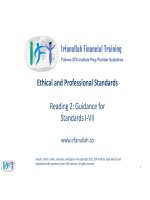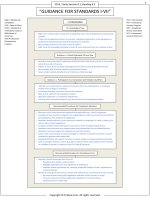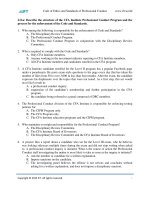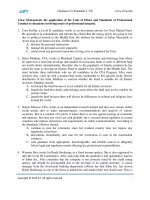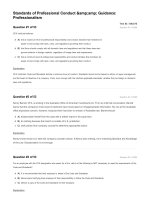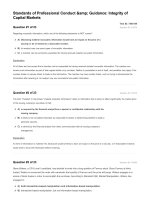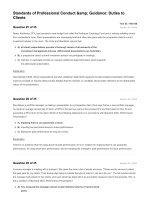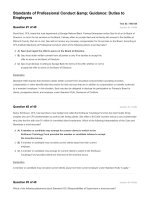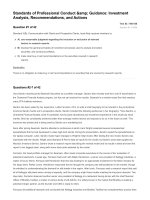CFA 2018 r02 guidance for standards i VII
Bạn đang xem bản rút gọn của tài liệu. Xem và tải ngay bản đầy đủ của tài liệu tại đây (684.15 KB, 33 trang )
Ethical and Professional Standards
Reading 2: Guidance for
Standards I-VII
www.ift.world
Graphs, charts, tables, examples, and figures are copyright 2014, CFA Institute.
Reproduced and republished with permission from CFA Institute. All rights reserved.
1
General Advice
• Read from the curriculum
• CFA Institute Online Course
• Standard
Guidance
Recommended Procedures for Compliance
Application of the Standard
• “Listen” to the lectures
www.ift.world
2
I. PROFESSIONALISM
A. Knowledge of the Law
B. Independence and Objectivity
C. Misrepresentation
D. Misconduct
www.ift.world
3
I(A) Knowledge of the Law
Members and Candidates must understand and comply with all applicable laws, rules, and regulations of any
government, regulatory organization, licensing agency, or professional association governing their professional
activities. In the event of conflict, Members and Candidates must comply with the more strict law, rule, or regulation.
Members and Candidates must not knowingly participate or assist in and must dissociate from any violation of such
laws, rules, or regulations.
Guidance
Recommended Procedures for Compliance
•
Relationship between the Code and
Standards and Applicable Law
•
Investment Products and Applicable Laws
•
Participation in or Association with
Violations by Others
•
•
•
•
•
•
www.ift.world
Stay informed
Review procedures
Maintain current files
Legal counsel
Dissociation
Advise/encourage your firm to:
• Develop and/or adopt a code of ethics
• Provide information on applicable laws
• Establish procedures for reporting violations
4
I(B) Independence and Objectivity
Members and Candidates must use reasonable care and judgment to achieve and maintain independence and
objectivity in their professional activities. Members and Candidates must not offer, solicit, or accept any gift, benefit,
compensation, or consideration that reasonably could be expected to compromise their own or another’s
independence and objectivity.
Guidance
Recommended Procedures for Compliance
•
•
•
•
•
•
•
•
•
•
•
•
•
•
•
•
Buy-Side Clients
Investment Banking Relationships
Public Companies
Issuer-Paid Research
Travel Funding
Credit Rating Agency Opinions
Influence during the Manager
Selection/Procurement Process
Brokerage Houses
www.ift.world
Protect the integrity of opinions
Create a restricted list
Restrict special cost arrangements
Limit gifts
Restrict investments
Review procedures
Independence policy
Appointed officer
5
I(C) Misrepresentation
Members and Candidates must not knowingly make any misrepresentations relating to investment
analysis, recommendations, actions, or other professional activities.
A misrepresentation is any untrue statement or omission of fact or any statement that is otherwise
false or misleading.
Guidance
Recommended Procedures for Compliance
Impact on Investment Practice
Performance Reporting
Social Media
Omissions
Plagiarism
Work Completed for Employer
•
•
•
•
•
www.ift.world
Factual Presentations
Qualification Summary
Verify Outside Information
Maintain Webpages
Plagiarism Policy
• Maintain copies
• Attribute quotations
• Attribute summaries
6
I(D) Misconduct
Members and Candidates must not engage in any professional conduct involving dishonesty, fraud, or deceit or
commit any act that reflects adversely on their professional reputation, integrity, or competence.
Guidance
Any act that involves lying, cheating, stealing,
or other dishonest conduct is a violation of this
standard if the offense reflects adversely on a
member’s or candidate’s professional activities.
Although CFA Institute discourages any sort of
unethical behavior by members and
candidates, the Code and Standards are
primarily aimed at conduct and actions related
to a member’s or candidate’s professional life.
Recommended Procedures for Compliance
•
•
•
www.ift.world
Code of ethics
List of violations
Employee references
7
II. INTEGRITY OF CAPITAL MARKETS
A. Material Nonpublic Information
B. Market Manipulation
www.ift.world
8
II(A) Material Nonpublic Information
Members and Candidates who possess material nonpublic information that could affect the value of an investment
must not act or cause others to act on the information.
Guidance
•
•
•
•
•
•
What Is “Material” Information?
What Constitutes “Nonpublic” Information?
Mosaic Theory
Social Media
Using Industry Experts
Investment Research Reports
Recommended Procedures for Compliance
• Achieve Public Dissemination
• Adopt Compliance Procedures
• Adopt Disclosure Procedures
• Issue Press Releases
• Firewall Elements
• Appropriate Interdepartmental Communications
• Physical Separation of Departments
• Prevention of Personnel Overlap
• A Reporting System
• Personal Trading Limitations
• Record Maintenance
• Proprietary Trading Procedures
• Communication to All Employees
www.ift.world
9
II(B) Market Manipulation
Members and Candidates must not engage in practices that distort prices or artificially inflate trading volume with the
intent to mislead market participants.
Guidance
•
Information-Based Manipulation
•
Transaction-Based Manipulation
www.ift.world
10
III. DUTIES TO CLIENTS
A. Loyalty, Prudence, and Care
B. Fair Dealing
C. Suitability
D. Performance Presentation
E. Preservation of Confidentiality
www.ift.world
11
III(A) Loyalty, Prudence, and Care
Members and Candidates have a duty of loyalty to their clients and must act with reasonable care and exercise
prudent judgment. Members and Candidates must act for the benefit of their clients and place their clients’ interests
before their employer’s or their own interests.
Guidance
Recommended Procedures for Compliance
•
•
•
•
•
•
•
•
Understanding the Application of Loyalty,
Prudence, and Care
Identifying the Actual Investment Client
Developing the Client’s Portfolio
Soft Commission Policies
Proxy Voting Policies
Regular Account Information
Client Approval
Firm Policies
•
•
•
•
•
•
•
•
•
www.ift.world
Follow all applicable rules and laws
Establish the investment objectives of the client
Consider all the information when taking actions
Diversify
Carry out regular reviews
Deal fairly with all clients with respect to
investment actions
Disclose conflicts of interest
Disclose compensation arrangements
Maintain confidentiality
12
III(B) Fair Dealing
Members and Candidates must deal fairly and objectively with all clients when providing investment analysis, making
investment recommendations, taking investment action, or engaging in other professional activities.
Guidance
Recommended Procedures for Compliance
•
•
•
Investment Recommendations
Develop Firm Policies
•
•
Investment Action
•
•
•
•
•
•
•
www.ift.world
Limit the number of people involved
Shorten the time frame between decision and
dissemination
Publish guidelines for pre-dissemination behavior
Simultaneous dissemination
Maintain a list of clients and their holdings
Develop and document trade allocation
procedures
Disclose Trade Allocation Procedures
Establish Systematic Account Review
Disclose Levels of Service
13
III(C) Suitability
1. When Members and Candidates are in an advisory relationship with a client, they must:
a. Make a reasonable inquiry into a client’s or prospective client’s investment experience, risk and return
objectives, and financial constraints prior to making any investment recommendation or taking investment
action and must reassess and update this information regularly.
b. Determine that an investment is suitable to the client’s financial situation and consistent with the client’s
written objectives, mandates, and constraints before making an investment recommendation or taking
investment action.
c. Judge the suitability of investments in the context of the client’s total portfolio.
2. When Members and Candidates are responsible for managing a portfolio to a specific mandate, strategy, or style,
they must make only investment recommendations or take only investment actions that are consistent with the
stated objectives and constraints of the portfolio.
Guidance
• Developing an Investment Policy
• Understanding the Client’s Risk Profile
• Updating an Investment Policy
Guidance (Cont…)
• The Need for Diversification
• Addressing Unsolicited Trading Requests
• Managing to an Index or Mandate
www.ift.world
14
III(C) Suitability
1. When Members and Candidates are in an advisory relationship with a client, they must:
a. Make a reasonable inquiry into a client’s or prospective client’s investment experience, risk and return
objectives, and financial constraints prior to making any investment recommendation or taking investment
action and must reassess and update this information regularly.
b. Determine that an investment is suitable to the client’s financial situation and consistent with the client’s
written objectives, mandates, and constraints before making an investment recommendation or taking
investment action.
c. Judge the suitability of investments in the context of the client’s total portfolio.
2. When Members and Candidates are responsible for managing a portfolio to a specific mandate, strategy, or style,
they must make only investment recommendations or take only investment actions that are consistent with the
stated objectives and constraints of the portfolio.
Recommended Procedures for Compliance
• Investment Policy Statement
• Regular Updates
• Suitability Test Policies
www.ift.world
15
III(D) Performance Presentation
When communicating investment performance information, Members and Candidates must make reasonable efforts
to ensure that it is fair, accurate, and complete.
Guidance
Recommended Procedures for Compliance
•
•
•
•
•
Provide credible performance
information to clients and
prospective clients
Avoid misstating performance or
misleading clients
If the presentation is brief make
available to clients and prospects, on
request, detailed supporting
information
Apply the GIPS Standards
Compliance without Applying GIPS Standards
•
•
•
•
•
consider the knowledge and sophistication of the audience
present the performance of the weighted composite of similar
portfolios rather than using a single representative account
include terminated accounts as part of performance history
include disclosures that fully explain the performance results
being reported
maintain the data and records used to calculate the
performance being presented
www.ift.world
16
III(E) Preservation of Confidentiality
Members and Candidates must keep information about current, former, and prospective clients confidential unless:
1. The information concerns illegal activities on the part of the client;
2. Disclosure is required by law; or
3. The client or prospective client permits disclosure of the information.
Guidance
Recommended Procedures for Compliance
•
•
•
•
•
Status of Client
Compliance with Laws
Electronic Information and Security
Professional Conduct Investigations
by CFA Institute
The simplest, most conservative, and most effective way to comply
with Standard III(E) is to avoid disclosing any information received
from a client except to authorized fellow employees who are also
working for the client.
www.ift.world
17
IV. DUTIES TO EMPLOYERS
A. Loyalty
B. Additional Compensation Arrangements
C. Responsibilities of Supervisors
www.ift.world
18
IV(A) Loyalty
In matters related to their employment, Members and Candidates must act for the benefit of their employer and not
deprive their employer of the advantage of their skills and abilities, divulge confidential information, or otherwise
cause harm to their employer.
Guidance
Recommended Procedures for Compliance
•
Employer Responsibilities
•
Competition Policy
•
Independent Practice
•
Termination Policy
•
Leaving an Employer
•
Incident-Reporting Procedures
•
Use of Social Media
•
Employee Classification
•
Whistleblowing
•
Nature of Employment
www.ift.world
19
IV(B) Additional Compensation Arrangements
Members and Candidates must not accept gifts, benefits, compensation, or consideration that competes with or might
reasonably be expected to create a conflict of interest with their employer’s interest unless they obtain written
consent from all parties involved.
Guidance
Recommended Procedures for Compliance
Obtain permission from before accepting
compensation that might create a conflict.
Make an immediate written report to supervisor and
compliance officer specifying any compensation you
propose to receive.
“Written consent” includes any form of
communication that can be documented.
Discuss possible limitations to their abilities to
provide services that may be competitive with
your employer during the negotiation and hiring
process.
The details of the report should be confirmed by the
party offering the additional compensation,
including performance incentives offered by clients.
This written report should state the terms of any
agreement.
www.ift.world
20
IV(C) Responsibilities of Supervisors
Members and Candidates must make reasonable efforts to ensure that anyone subject to their supervision or
authority complies with applicable laws, rules, regulations, and the Code and Standards.
Guidance
Recommended Procedures for Compliance
•
System for Supervision
•
Codes of Ethics or Compliance Procedures
•
Supervision Includes Detection
•
Adequate Compliance Procedures
•
Implementation of Compliance Education and
Training
•
Establish an Appropriate Incentive Structure
www.ift.world
21
V. INVESTMENT ANALYSIS,
RECOMMENDATIONS, AND ACTIONS
A. Diligence and Reasonable Basis
B. Communication with Clients and Prospective Clients
C. Record Retention
www.ift.world
22
V(A) Diligence and Reasonable Basis
Members and Candidates must:
1. Exercise diligence, independence, and thoroughness in analyzing investments, making investment
recommendations, and taking investment actions.
2. Have a reasonable and adequate basis, supported by appropriate research and investigation, for any investment
analysis, recommendation, or action.
Guidance
Recommended Procedures for Compliance
•
•
•
•
•
•
•
Defining Diligence and Reasonable Basis
Using Secondary or Third-Party Research
Using Quantitatively Oriented Research
Developing Quantitatively Oriented
Techniques
Selecting External Advisers and Subadvisers
Group Research and Decision Making
•
•
•
•
•
Establish a policy that research reports must have
reasonable and adequate basis
Written guidance
Criteria for assessing the quality of research
Detailed, written guidance for testing of all computerbased models
Measurable criteria for assessing outside providers
Criteria for evaluating for evaluating external advisers
www.ift.world
23
V(B) Communication with Clients and Prospective Clients
Members and Candidates must:
1. Disclose to clients and prospective clients the basic format and general principles of the investment processes they
use to analyze investments, select securities, and construct portfolios and must promptly disclose any changes that
might materially affect those processes.
2. Disclose to clients and prospective clients significant limitations and risks associated with the investment process.
3. Use reasonable judgment in identifying which factors are important to their investment analyses,
recommendations, or actions and include those factors in communications with clients and prospective clients.
4. Distinguish between fact and opinion in the presentation of investment analyses and recommendations.
Guidance
Recommended Procedures for Compliance
•
•
•
•
•
Depends heavily on case-by-case review rather than
a specific checklist
Informing Clients of the Investment Process
Different Forms of Communication
Identifying Risk and Limitations
Report Presentation
Distinction between Facts and Opinions in
Reports
www.ift.world
24
V(C) Record Retention
Members and Candidates must develop and maintain appropriate records to support their investment analyses,
recommendations, actions, and other investment-related communications with clients and prospective clients.
Guidance
Recommended Procedures for Compliance
•
New Media Records
•
Records Are Property of the Firm
The responsibility to maintain records that support
investment action generally falls with the firm rather
than individuals.
•
Local Requirements
You should archive research notes and other
documents that support investment-related
communications
www.ift.world
25
